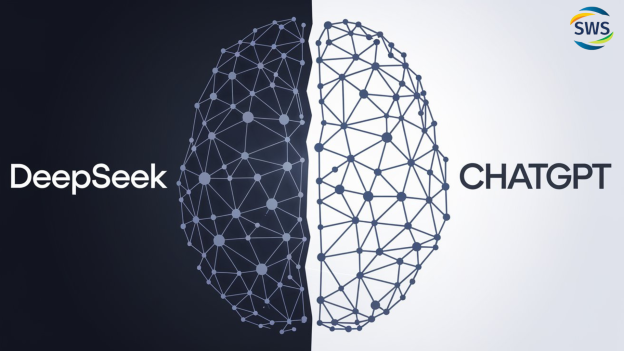SearchGPT Stuns the World with Its New Features

 8th Aug, 2024
8th Aug, 2024
OpenAI is a leading artificial intelligence research laboratory consisting of the for-profit OpenAI LP and its parent company, the non-profit OpenAI Inc. Founded in December 2015 by Elon Musk, Sam Altman, Greg Brockman, Ilya Sutskever, Wojciech Zaremba, and John Schulman, OpenAI aims to ensure that artificial general intelligence (AGI) benefits all of humanity. The organization focuses on developing and promoting friendly AI in a way that aligns with human values and safety.
OpenAI is renowned for its advancements in machine learning and deep learning technologies. Some of its notable projects include the development of the GPT (Generative Pre-trained Transformer) series, which has revolutionized natural language processing through models like Chat GPT-3 and Chat GPT-4. These models are capable of understanding and generating human-like text, enabling various applications ranging from chatbots to advanced search engines such as SearchGPT.
In addition to natural language processing, OpenAI works on several other AI domains including robotics, computer vision, and reinforcement learning. The organization collaborates with academic institutions, industry partners, and governments to advance AI research while adhering to ethical guidelines.
SearchGPT, developed by OpenAI, is a new AI-powered search engine that aims to compete with traditional search engines like Google. Unlike these conventional platforms, SearchGPT focuses on providing an interactive and user-friendly experience.
Some of its key features include:
- Conversational Interface: Users can communicate with the search engine using natural language and ask follow-up questions without any hassle.
- Real-Time Information Retrieval: SearchGPT strives to provide the most current information available, along with proper citations, in order to combat misinformation.
- Ad-Free Browsing: Currently, there are no advertisements on SearchGPT, ensuring a distraction-free search experience.
AI is playing a vital role in changing the way users interact with search engines. By utilizing advanced technologies such as natural language understanding and real-time data processing, SearchGPT aims to greatly improve the user experience. Its innovative features not only make it easier to find information but also raise the bar for what users can expect from an AI-powered search engine.
Understanding SearchGPT and Its Advanced Features
Definition and Purpose of SearchGPT
SearchGPT is an AI-powered search engine created by OpenAI, designed to change the way users interact with search engines. Unlike traditional search engines that rely on keyword-based algorithms, SearchGPT uses advanced natural language processing (NLP) to understand and respond to user queries in a more conversational manner. This approach aims to provide more relevant and accurate results, creating a smooth user experience.
Key Functionalities that Differentiate It from Traditional Search Engines
SearchGPT has several features that make it different from regular search engines like Google and Bing:
- Conversational Interface: Users can have a conversation with the search engine, allowing for follow-up questions and iterative searches.
- Real-time Access: The tool retrieves up-to-date information as it happens, ensuring users receive the most current data available.
- Ad-free Browsing: Currently, SearchGPT offers an ad-free experience, focusing solely on delivering high-quality search results without commercial interruptions.
Real-time Information Retrieval Capabilities
One of the standout features of SearchGPT is its ability to provide real-time information retrieval. This capability means you get the latest news updates, live sports scores, or any other time-sensitive information without delay. Traditional search engines often struggle with lag in updating their databases, but SearchGPT’s real-time access ensures you’re always informed.
Conversational Interface
The conversational interface is another game-changer. Traditional search engines usually give you a list of links based on keyword matches. In contrast, SearchGPT allows you to ask a question in natural language and receive a direct answer. You can also ask follow-up questions or seek clarifications within the same session, making your search process more interactive and efficient.
Ad-free Browsing Experience
In its current phase, SearchGPT provides an ad-free browsing experience. This feature enhances user satisfaction by eliminating distractions commonly found in traditional search engines like Google or Bing. You can focus on obtaining valuable information without being bombarded by advertisements.
These advanced features collectively offer a more intuitive, engaging, and efficient way to perform searches compared to traditional methods.
The Technology Behind SearchGPT: GPT-4 Powering the Future of Search
Understanding GPT-4 Technology
SearchGPT uses GPT-4, an advanced language model created by OpenAI. This technology is what allows it to provide highly accurate and relevant search results. GPT-4, which stands for Generative Pre-trained Transformer 4, is the latest version in a series of improved AI models. Its purpose is to understand and generate human-like text based on large amounts of data from the internet.
Key features of GPT-4 include:
- Improved Natural Language Processing (NLP): The model understands complex queries, enabling more detailed searches.
- Deep Learning Algorithms: These algorithms allow the system to learn from various datasets, ensuring a broad understanding of different topics.
- Contextual Awareness: GPT-4 can maintain context over longer conversations, allowing for follow-up questions and iterative searches.
How GPT-4 Enhances Search Accuracy and Relevance
The use of GPT-4 greatly improves the accuracy and relevance of search results provided by SearchGPT. Here’s how:
- Understanding Context
- Retrieving Real-time Information
- Using a Conversational Interface
- Providing Source Attribution
- Offering an Ad-free Browsing Experience
1. Understanding Context
Unlike traditional search engines that rely heavily on matching keywords, GPT-4 understands the context behind user queries. This leads to more precise answers tailored to specific needs.
2. Retrieving Real-time Information
With access to real-time web data, GPT-4 ensures that you receive the most current information. This is especially useful for breaking news or rapidly changing topics.
3. Using a Conversational Interface
The conversational abilities powered by GPT-4 make interactions with SearchGPT feel more natural and user-friendly. You can ask follow-up questions without having to start over, creating a smoother search experience.
4. Providing Source Attribution
To combat misinformation, SearchGPT includes clear source attributions for its answers. This transparency allows users to quickly verify the accuracy of information.
5. Offering an Ad-free Browsing Experience
Currently, SearchGPT provides an ad-free browsing environment, improving user experience by removing distractions typically found in traditional search engines.
The advanced technology behind GPT-4 not only sets a new standard for AI-powered searches but also reshapes what users can anticipate from their online interactions. As you explore this tool’s features, you’ll see how each aspect contributes to a more refined and efficient search process.
ChatGPT Integration: Transforming Local Searches with AI Assistance
The upcoming ChatGPT integration aims to change how you perform local searches. By combining the powers of SearchGPT and ChatGPT, OpenAI is developing a powerful tool for better local information retrieval. This integration will enable users to receive highly personalized recommendations based on their individual needs and preferences.
Key Benefits:
- Personalized Recommendations: Whether you’re looking for the best coffee shop nearby or an urgent service like a plumber, the combination of SearchGPT and ChatGPT offers tailored suggestions that match your specific criteria.
- E-commerce Solutions: Imagine browsing local stores online and receiving real-time updates about product availability, prices, and reviews. This feature can significantly streamline your shopping experience.
Real-World Applications:
- A tourist exploring a new city can use the integrated tool to find popular attractions, dining options, and transportation routes.
- Small business owners can leverage this feature to reach potential customers more effectively by appearing in relevant local searches.
This innovative approach not only enhances user experience but also provides businesses with new opportunities for visibility and customer engagement.
Exploring the Advantages and Unique Selling Propositions of SearchGPT
SearchGPT offers several unique benefits that make it stand out from its competitors. These advantages make it an excellent choice for users looking for advanced search features.
Key Advantages of SearchGPT
1. Natural Language Understanding
SearchGPT excels in understanding and processing natural language queries, allowing users to interact with the search engine in a conversational manner. This feature simplifies complex searches and makes information retrieval more intuitive.
2. Real-Time Information Retrieval
Unlike traditional search engines, SearchGPT offers real-time access to web data, ensuring that the information provided is up-to-date. This capability is particularly beneficial for time-sensitive queries and breaking news.
3. Ad-Free Browsing Experience
Currently, SearchGPT provides an ad-free browsing experience, enhancing user satisfaction by eliminating distracting advertisements. This focus on user experience ensures a cleaner and more enjoyable interaction with the search engine.
4. Source Attribution
To combat misinformation, SearchGPT includes clear source attribution for all retrieved information. Users can easily verify the credibility of the content, fostering trust and reliability.
5. Visual Search Results
SearchGPT offers visually appealing search results that enhance readability and engagement. This feature allows users to quickly grasp key information through well-organized visual elements.
Differentiators from Competitors
Integration with ChatGPT
The planned integration with ChatGPT will enable personalized recommendations and local information retrieval, providing an edge over conventional search engines in delivering tailored user experiences.
Partnerships with Major Publishers
Collaborations with reputable publishers like Vox Media ensure high-quality, reliable content within search results. These partnerships enhance the credibility and accuracy of the information provided by SearchGPT.
SearchGPT’s combination of innovative features positions it as a strong competitor in the AI-powered search engine market. Its focus on user experience, accuracy, and real-time data access sets it apart from its peers.
User Experiences with SearchGPT: Insights from Early Adopters and Test Users
User experiences with SearchGPT have been overwhelmingly positive, with many early adopters highlighting its innovative features and usability. This section delves into firsthand accounts to provide a clearer picture of how effective SearchGPT is in real-world scenarios.
Feedback on Usability
Several users have praised the conversational interface of SearchGPT, noting that it feels more intuitive and engaging compared to traditional search engines. The natural language understanding capabilities allow users to type queries as they might ask a question in a conversation, making the search process more fluid and less rigid.
- Ease of Use: Test users appreciate that they don’t need to use specific keywords or phrases to get accurate results. They find the conversational tone both refreshing and user-friendly.
- Interactive Nature: The ability to ask follow-up questions without starting a new search adds an interactive layer that’s not commonly found in other search engines.
Effectiveness in Finding Information
The effectiveness of SearchGPT in retrieving relevant information has been another highlight for users. Here are some key points based on user feedback:
- Real-Time Information Retrieval: Users have noted that the real-time web access feature ensures they receive up-to-date information. This is particularly useful for news-related searches or time-sensitive topics.
- Source Attribution: Clear source citations help build trust among users. Knowing where the information comes from allows users to assess the credibility of their search results quickly.
- Ad-Free Browsing: Many test users have enjoyed an ad-free experience, making their searches feel less cluttered and more focused on obtaining actual information.
Real-Life Examples
A beta tester named Sarah mentioned how she used SearchGPT to plan her vacation. She appreciated the detailed responses about local attractions, weather updates, and even restaurant recommendations. Another tester, John, shared his positive experience using SearchGPT for academic research, finding it easier to locate reliable sources compared to other search engines.
“SearchGPT feels like having a knowledgeable friend helping you out,” said Sarah. “It’s so much more than just a search engine.”
These firsthand accounts underline the practical benefits and overall effectiveness of SearchGPT in various contexts, reinforcing its potential as a game-changer in the search engine market.
Addressing Challenges Ahead for AI-powered Searches: Misinformation and Hallucinations in AI Responses
The emergence of AI-powered searches like SearchGPT introduces significant challenges related to misinformation and accuracy. One primary concern is the phenomenon known as hallucinations in AI. This occurs when the model generates information that appears plausible but is factually incorrect or entirely fabricated.
Potential Issues with Misinformation
- Source Reliability: Despite SearchGPT’s capability to provide real-time information with source citations, the reliability of these sources can vary. Ensuring that each source is credible and unbiased remains a critical task.
- Content Misinterpretation: Natural language processing models may misinterpret user queries, leading to inaccurate or irrelevant results. This risk is heightened when dealing with complex or nuanced topics.
- Rapid Information Changes: The dynamic nature of information, especially in areas like current events or scientific research, poses a challenge. AI must continually update its knowledge base to avoid spreading outdated or incorrect data.
Hallucinations in AI
- False Assertions: Instances where SearchGPT might confidently present false assertions as facts can undermine user trust. These hallucinations are problematic, particularly when users rely on search engines for accurate information.
- Mitigation Strategies: OpenAI must implement robust validation mechanisms. Cross-referencing multiple credible sources and incorporating feedback loops can help minimize the occurrence of hallucinations.
Addressing these challenges involves a multi-faceted approach:
- Enhanced Validation Processes: Implementing stringent checks and balances to verify the accuracy of information before serving it to users.
- User Feedback Integration: Actively incorporating user feedback to identify and correct inaccuracies swiftly.
- Collaborative Efforts: Partnering with established content providers and leveraging their editorial standards can bolster the reliability of search results.
Striking a balance between innovation and reliability will be crucial for SearchGPT’s success in the competitive landscape of AI-powered searches.
Navigating the Competitive Landscape: Perplexity, You.com, and Other Rivals to Watch Out For
The AI-powered search engine market is becoming increasingly competitive with several notable players vying for dominance. Perplexity and You.com are two significant competitors to SearchGPT, each bringing unique features to the table.
Perplexity
Perplexity is designed to deliver concise and accurate answers by leveraging advanced natural language processing (NLP) techniques. This tool focuses on understanding complex queries and providing direct, contextually relevant responses. Its strengths include:
- Advanced NLP Capabilities: Ensures precise understanding of user queries.
- Concise Responses: Delivers short and accurate answers to user questions.
- User-Friendly Interface: Simplifies the search process through an intuitive design.
You.com
You.com offers a different approach by allowing users to customize their search experience. It combines traditional search functionalities with AI-driven features, emphasizing user control over search results. Key benefits include:
- Customizable Search Experience: Users can tailor their search settings according to personal preferences.
- Privacy-Focused Approach: Prioritizes user privacy by minimizing data collection.
- AI Integration: Uses artificial intelligence to enhance search accuracy and personalization.
Other Contenders
Several other AI tools are also emerging as potential rivals in this space:
- Neeva: Focuses on an ad-free experience with a subscription-based model.
- DuckDuckGo: While not AI-centric, it remains a strong competitor due to its privacy-focused ethos.
These competitors to SearchGPT each have unique selling propositions that appeal to different segments of the market. Understanding these distinctions helps in evaluating where SearchGPT stands in the evolving landscape of AI-powered searches.
Future Prospects for OpenAI’s Ambitious Plans in the Search Engine Domain
OpenAI’s future plans for search engines are both visionary and ambitious. The long-term development and scaling of SearchGPT hinge on continuous advancements in AI technology. OpenAI envisions a search engine that not only responds to queries but also understands context, nuances, and the intent behind questions.
Long-Term Vision for Development
- Enhanced Conversational Abilities: OpenAI aims to refine SearchGPT’s conversational interface, making it more intuitive and capable of handling complex dialogues.
- Personalization: Leveraging user data to offer highly personalized search experiences without compromising privacy.
- Real-Time Updates: Ensuring SearchGPT provides the most current information by constantly updating its database in real-time.
Influences of Strategic Partnerships
Partnerships play a critical role in shaping OpenAI’s growth strategies. Collaborations with tech giants like Microsoft could significantly impact SearchGPT’s market positioning.
- Microsoft Integration: With Microsoft’s substantial investment and integration into Bing, SearchGPT can benefit from a broader user base and enhanced infrastructure.
- Content Licensing Agreements: Partnering with major publishers ensures access to high-quality content, enhancing the reliability and credibility of search results.
These strategic moves indicate a robust plan to scale operations while maintaining high standards of accuracy and user satisfaction.
The vision extends beyond just competing with established players like Google; it aspires to redefine the way people interact with search engines, making information retrieval not just efficient but also engaging and accurate.
This ambition sets a high bar for the future of AI-powered searches, positioning OpenAI at the forefront of innovation in this domain.
Collaborations with Major Publishers: Ensuring Credibility through Content Licensing Agreements
Partnerships with major publishers such as Vox Media are crucial for SearchGPT, as they guarantee the provision of reliable and high-quality information. These collaborations allow SearchGPT to access a wealth of verified content, ensuring that users receive accurate and trustworthy results.
Key benefits of these partnerships include:
- Enhanced Credibility: By aligning with established publishers, SearchGPT can offer results that users trust, mitigating concerns over misinformation.
- Content Diversity: Collaborating with various news partners allows SearchGPT to cover a wide range of topics, providing comprehensive search results.
- Source Attribution: Proper citation of sources from recognized publishers enhances transparency and user confidence in the provided information.
These collaborations are part of OpenAI’s strategy to build a robust and reliable search engine. By leveraging licensed content from reputable sources, SearchGPT can stand out in the competitive AI-powered search engine market.
The Future of AI-Powered Search Engines: A Shift Driven by SearchGPT?
The future of AI-powered search engines is on the verge of a potential shift with innovations like SearchGPT. With its advanced natural language understanding, real-time information retrieval, and conversational interface, SearchGPT offers a unique approach to online searching. This tool not only aims to enhance user experience through ad-free browsing and clear source attributions but also seeks to transform how we interact with search engines.
Key innovations driving this shift:
- Conversational Interactions: Facilitates a more intuitive and engaging search experience.
- Real-Time Information: Ensures users receive the most up-to-date and relevant answers.
- Source Attribution: Mitigates misinformation by providing clear references.
As OpenAI continues to refine SearchGPT, it sets the stage for a new era in online search. The integration of AI into search functionalities has the potential to redefine user expectations and challenge the status quo dominated by traditional search engines like Google.
The collaboration with major publishers enhances credibility, while partnerships with tech giants like Microsoft expand reach and capabilities. These advancements suggest that we are indeed witnessing a significant turning point in the evolution of online searching. Companies like OpenAI are not just participating in this transformation; they are leading it forward.
FAQs (Frequently Asked Questions)
What is SearchGPT?
SearchGPT is an innovative search tool developed by OpenAI, designed to enhance the search experience through AI-powered functionalities. It aims to transform traditional search methods by providing real-time access to information and a conversational interface.
How does SearchGPT differ from traditional search engines?
SearchGPT differentiates itself from traditional search engines like Google and Bing by offering real-time information retrieval, a conversational interface for user interactions, and an ad-free browsing experience, which enhances overall user satisfaction.
What technology powers SearchGPT?
SearchGPT is powered by OpenAI’s advanced GPT-4 technology, which enhances the accuracy and relevance of search results. This underlying technology allows for improved understanding of user queries and more precise information delivery.
What are the benefits of integrating ChatGPT with SearchGPT?
The integration of ChatGPT with SearchGPT aims to enhance local information retrieval, providing users with personalized recommendations and e-commerce solutions. This collaboration will improve the overall user experience by delivering tailored results based on individual needs.
What challenges does SearchGPT face in terms of misinformation?
One significant challenge for AI-powered searches like SearchGPT is addressing misinformation and hallucinations in AI responses. Ensuring the accuracy of information retrieved is crucial for maintaining user trust and effectiveness in search functionalities.
What are OpenAI’s future plans for SearchGPT?
OpenAI envisions long-term development and scaling of SearchGPT, focusing on enhancing its capabilities and expanding partnerships, such as with Microsoft. These strategies are expected to influence growth and position SearchGPT as a leader in the evolving landscape of AI-powered search engines.
we are your one-stop internet marketing solution on the sunshine coast!

 07 5479 3888
07 5479 3888








